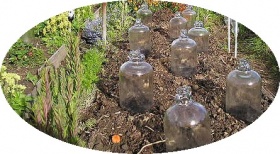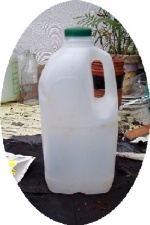Difference between revisions of "Making things"
From Allotments4All
| Line 130: | Line 130: | ||
[[Image:Milkpot5.jpg|none|thumb|150px|Stage 4]] | [[Image:Milkpot5.jpg|none|thumb|150px|Stage 4]] | ||
</div> | </div> | ||
| + | |||
| + | |||
| + | |||
| + | |||
| + | |||
| + | |||
| Line 136: | Line 142: | ||
<div style="float:middle;width:150px;"> | <div style="float:middle;width:150px;"> | ||
| − | [[Image: | + | [[Image:levelingstrip.jpg|none|thumb|150px|Stage 4]] |
</div> | </div> | ||
Revision as of 15:06, 25 February 2006
Contents
Creative Options
This page contains guidance and photos of practical allotment equipment that you can make at low cost from either new materials or recycled items.
Bell Cloches from Demijohns
All you need is one of those hand held glass cutters with the little wheel on it and a work bench or a table top vice so you can clamp the glass cutter with the wheel rotating horizontally about an inch off the work surface.
With the glass cutter firmly clamped in place you score the groove around the bottle by resting it on the work surface and then rotating it while pressing it against the cutter wheel. Try and get a single score mark which is joined up all the way around
Then you need to fashion youself something like a quarter of an inch thick metal rod with a slight bend about a couple of centimetres from one end. The shape and length of this is quite important since you are going to use to stick down the inside of the demijohn.
You use this to tap lightly at the score line from the inside of the bottle. If you tap fairly lightly you will get a slight crack forming at that point. Then you move another half a centimetre along the score line and tap again and the crack will follow the line you have scored on the outside of the bottle ( I know, I didn't believe it either but if you are gentle with the tapping the crack will run true and follow the score line).
As you work you way round the sound made by the tapping starts to get quite dull, which is a warning that both parts will soon part company. When the crack is completely joined up, your new bell jar will part company with your new flowerpot tray!
Tip: Giving the demijohn bit of a wash in warm water helps and working in the warm also makes the glass a bit easier to work with too.
For safety sake you may want to think about using rubber gloves and wearing goggles or glasses when you are cutting the glass. Also you can give the bottom edges of the demijonn a good twist on sandy soil to make them less sharp.
If you don't have any demijohns its worth keeping your eyes open at the local glass recycling point.
Hosepipe joints to make bamboo arches
You can use short bits of hose pipe as 'universal joints' between bamboo canes. A bit of pipe with two 6 foot canes poked in the ends will help to make and easy build 'A' frame or an archway over the path between two raised beds, (very handy way to use redundant space and sunlight for growing Runner beans or Climbing French beans over). Three short bits of bamboo joined by two bits of hose pipe can be used as a low frame to cover any beds which low growing soft fruit is planted in.
-
Origami Plant Pots
There are quite a few different ways of making flowerpots out of newspaper, smaller ones can be made using a 'former' and larger square pots can be made using the following method - http://www.geocities.com/newspaperpots/
Plant Pots from Plastic Milk Containers
By following the diagrams below you can use 4 pint containers to create your own pots. These will have the benefit of having their own drip trays which means they can be stored indoors without mess.
By using the top half of the container the handle hole can serve as a capillary for water and feed, a few holes can also be drilled in the screw cap for drainage.
-
-
-
-






